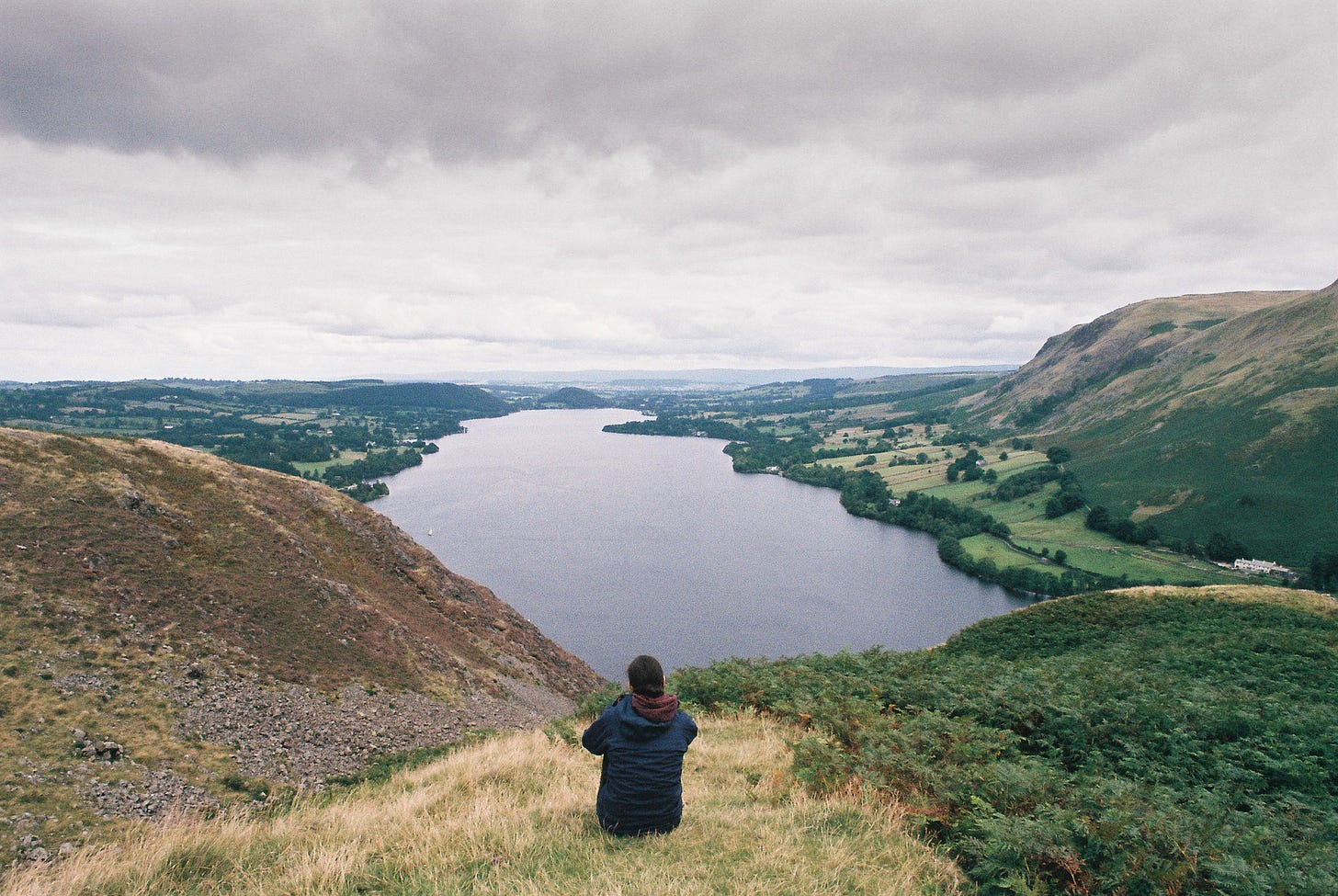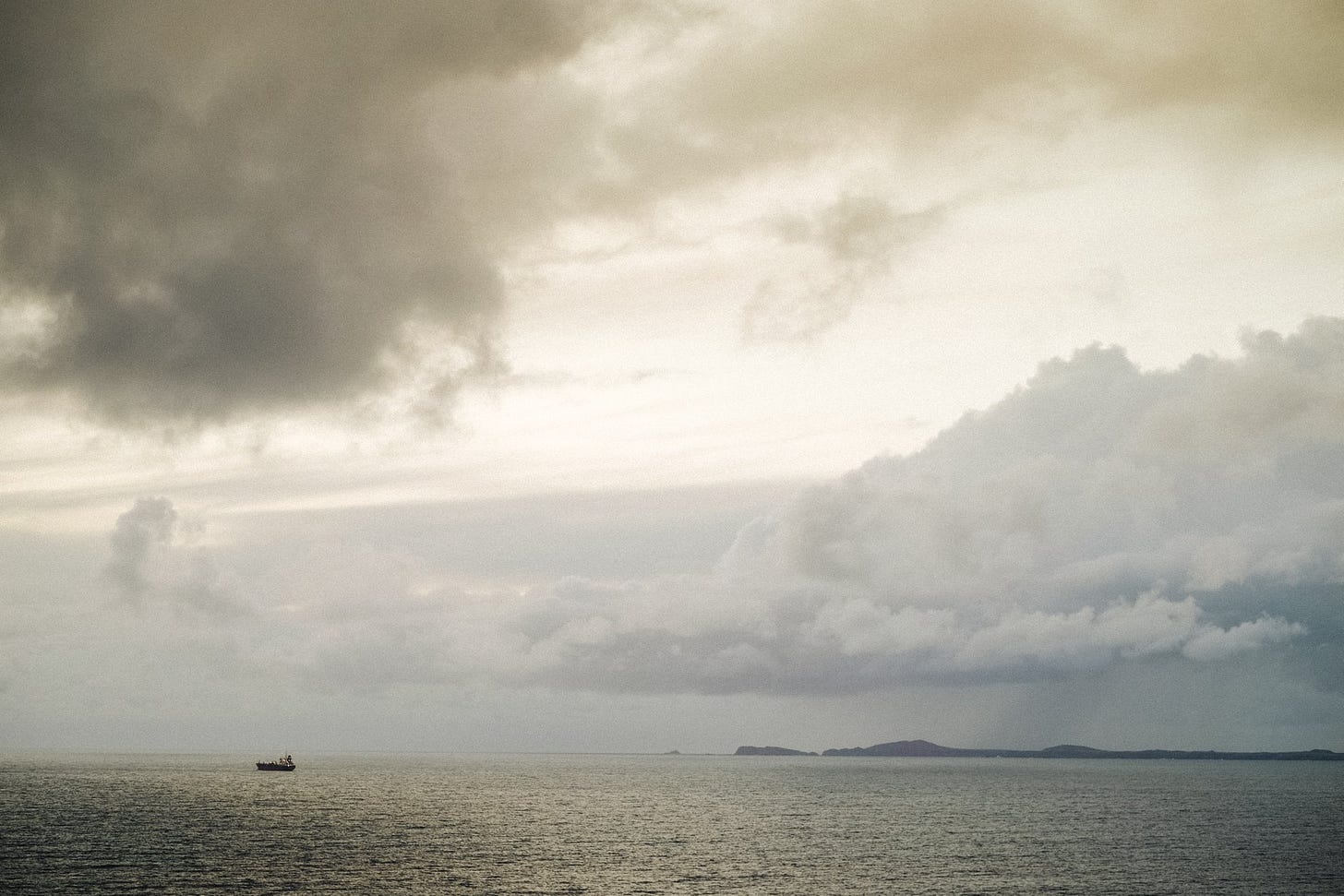For so long, I tried to escape my grief. I couldn’t bear to be with it. When I watched my mother take her last breath and the sky broke open; my heart did too. My body wanted to express the staggering shock of what I felt.
But when I looked to the adults in my life, something else was reflected back to me. Without words, they told me that my grief was too much. Too big. Too terrifying. I learned that my grief must be contained. It must be held inside my body. It must be silenced.
The day after my mother died, our GP came round and left us some Valium pills on the bookshelf.
‘In case things get too much,’ she said.
I remember feeling afraid. Would I be overtaken by grief? Would I go mad with it? Would I be shaking and screaming, unable to stop? Is that when drugs needed to be administered?
I went to school two days later. I did burst into tears, briefly, that morning. I will never forget the look of terror on my form teacher’s face. After that day I would only cry once more at school: on my own, in the toilets, as quietly as I could. The Valium was not needed.
I believed that my grief was shameful. I was embarrassed to even tell people my mother had died - there seemed to be an inherent shame in admitting this. A vulnerability that I shouldn’t expose to other people, lest it make them uncomfortable. And so, as I grew into an adult, my body twisted and tightened around this deep well of feeling. I was afraid of it, but I was keeping it under control. I got A*s at school. I was polite and obedient. I held and I held and I held it all in - until I couldn’t any longer.
In alcohol I found a kind of release. After being a ‘good girl’ for so long, this drug gave me some kind of wild abandon. Where I essentially didn’t give a fuck. And my grief - no longer crushed inside - would rush out, overwhelm me, express itself in confusing and distressing ways.
When I was 19 I had a whirlwind relationship with a boy who was besotted with me for a few weeks and told his friends I was ‘his ideal woman.’ But one night, after we both got drunk at a party, I had a panic attack. He was furious and afraid.
The next morning he acted like he barely knew me. When I tried to hug him, his body stiffened.
He played the same Rage Against the Machine album on repeat as he drove us back home from Cornwall. He knew I didn’t like the band. It felt like I had lost him and I couldn’t bear it.
‘Sometimes my mood changes,’ I said. ‘I don’t know why. I’m sorry. I think it’s because of my mum dying…’
He focused on navigating a roundabout and when he replied, he was nonchalant.
‘Well, maybe that’s something you need to get over,’ he said.
I swallowed, and squeezed my hands together tightly. They felt suddenly cold.
A week later, when he broke up with me, I collapsed at the bottom of the stairs in my house. My arms and legs went completely numb. I was inconsolable. It was like the world had given me love and then suddenly snatched it away. The strength of my feeling confused everyone - after all, the relationship had only been a few weeks.
But I felt like I was falling, on fire, through the sky.
How can grief be solved, then, when it doesn’t go away?
When I started drinking alcohol regularly, I thought I’d found a cure for grief. It clouded my thoughts, numbed my body and seemed to soothe my pain.
What was actually happening was that the first couple of drinks brought temporary relief, and then after that it was downhill. Often my grief would be brutally magnified - especially if I was drinking alone. Or, I’d make the mistake of confiding in another 20-ish-year-old who invariably said something insensitive and I’d plunge into a desperate loneliness. That special kind of pain that comes from having deeply painful feelings, and being alone with those feelings.
When I shared my grief with others - even just the bare fact that my mother was dead, without emotion attached - the response was so often visible discomfort from the other person. Cheeks reddening with embarrassment. Eyes averted. Or sometimes a lip curled in disgust.
Christmas and my birthday (which is Christmas Eve) were always especially hard. Every year, as the January anniversary of my mum’s death loomed, a feeling of dread rumbled like a gathering storm. As the days passed, I felt increasing panic, as if I was moving towards something terrible that I had no power to stop.
Christmas Eve and Day brought up intolerable feelings. Desperate grief, sadness and loneliness, made so much worse by the cruel expectation to pretend everything was fine. That I was happy and grateful for gifts and celebration. But it was a macabre juxtaposition, like a grinning clown at a funeral.
It always brought up memories of this last time with my mother, when she had written labels on every single present. She had stuck heart stickers on them and written ‘I love you so so much, your Mummy xxx’. As I slowly unwrapped each gift she said to me, ‘Keep the labels. Make sure you keep all the labels.’ I watched her gather them all carefully into a pile.
I wanted to escape these memories. I wanted them to leave me alone. I longed to fall asleep on the 23rd of December and wake up on Boxing Day. Every year I tried to escape my memories and my feelings by drinking.
I had turned grief into my enemy. This feeling - this emotion that lived inside me, that was a part of me - I was hating. I hated it so much that I was harming myself physically to try to make it leave me alone.
Now, I promised to tell you how I learned to be with my grief. And writing about all this is so very sad for me, and perhaps for you too, and so I want to offer some hope - especially if you, too, feel overwhelmed by your grief.
What I have found is something surprising. It sounds counter intuitive. It is certainly counter to what our culture teaches us about grief and any difficult feelings. What I have learned is: suffering is when we feel pain and we resist it. Soothing is when we meet our pain with love.
When my dad was dying, I started to see a therapist. When I shared with her my shame at my use of alcohol, drugs, sexual relationships and self-harm and how it showed that I wasn’t coping she said:
‘But Ellie, you were coping. That’s how you were coping.’
Her response stunned me. But she was right. Having been abandoned to deal with my grief alone, I had had to find a way to cope. And, alongside Valium pills and antidepressants (both of which I was prescribed), our culture provides a socially-sanctioned drug available at every supermarket and corner shop. A free-flowing, regulated, reasonably affordable way to try to escape your pain on a daily basis. With just a few minor side-effects, like all-consuming shame. Which was just what I needed: shame on top of shame on top of shame.
Therapy didn’t cure my addiction, but it was the beginning of my journey to learning self-compassion. How to be with my emotions when they arose. Compassion means to be with suffering. In therapy sessions, I would often meet my grief. My therapist explained that in the safety of the 50 minute session, I could touch on it, and then come back. That I didn’t have to fall into it. That it didn’t have to drown me.
Often, to be honest, I found it pretty intolerable. When it felt too much, I would drink after sessions to try and numb out what I had felt. But many times, too, it did help. I remembered awful things. I felt that enormous, howling loss that had lived inside me for so long. I cried and cried.
And then I would gradually stop crying. And I felt a bit better. The pain faded. I’d feel exhausted, yes. But certainly not flooded by emotional pain.
If I was on a Zoom call it was often easier than having therapy in person and then having to go straight out into the world, still tender and raw. Once the call ended, I could stay sitting on the sofa and give myself a hug. Could let the sun from the window warm my face and listen to the bird’s singing outside.
And then I could do something comforting: move a bit, maybe dance. Get myself some water and something tasty to eat. Watch a comedy show.
Be so exquisitely gentle with myself.
Then came my journey to quit alcohol, finally made possible when I discovered This Naked Mind. And being with my feelings - including grief - was an absolutely crucial part of this.
And then finally, over two decades after my mother died, I felt ready to really turn towards my grief. To welcome it, and honour it. I found The Grief Space created by the incredible
. Over the past 18 months I’ve had one-to-one sessions with Nici, and taken part in several of her online grief circles including The Medicine of Grief.It has changed my life. Nici holds space in the most gentle, compassionate way. I felt safe and held in her presence, and the presence of others who, like me, were walking through life alongside deep grief and loss.
Last winter was the first time in 23 years that Christmas didn’t feel intolerable. The first time when that old, familiar dread didn’t visit me. I waited for it; I expected it, and yes, I braced for it. And it didn’t come. My birthday arrived, Christmas came and went. Sadness came to me, yes, undoubtably. And memories of past Christmases and birthdays. Sadness came, yes, and grief. Soft and gentle, tinged with love. What I felt for the most part was just… OK. Which is all I’ve ever longed to feel.
I also felt grateful. Grateful for my gorgeous son squealing with excitement as we put up the tree. Grateful for my family and all the people who love me, and who I love. Also a bit overwhelmed, and uneasy about the consumerism that surrounds this festival. Yes, all that. And more. All the many varied feelings a human being can have in any one day - in any one hour, in any one moment.
I used to apologise to people for my ever-changing moods. I thought it was a sign something was wrong with me; that it was a symptom of mental illness.
How bittersweet to now know differently. To know that this is just my experience of being a human. Ever flowing, ever changing. All here to be seen, to be held, to be welcomed, to be accepted, before it can move on.
The great truth and irony is that when we refuse to feel our emotions, they stay stuck. They can’t move on. And so we end up in all kinds of unnecessary pain.
I have been taking part in
’s Motherless Daughters grief circle. Connecting with other women who have lost their mothers - years ago, or barely months ago. Our experiences are unique but we have so much in common. Last week she invited us to write what our grief would say if it could speak. I wrote:If my grief could speak it would rage, it would scream, it would cry.
It would say: how can I be OK in the world? Why won’t anyone accept me? Why does everyone hate me? Why can’t I be accepted? Why can’t I be loved?
Why does everyone turn away from me?
I think that these are my grief’s words for me. It’s longing for me to not only see it, and accept it, but embrace it. A part of me so wounded and tender, so longing for love. A part I have found difficult to love for so long.
The truth is, when we close our hearts to grief, we close our hearts to so much more.
As Francis Weller writes in his vital book, The Wild Edge of Sorrow:
“My grief says that I dared to love, that I allowed another to enter the very core of my being and find a home in my heart. Grief is akin to praise; it is how the soul recounts the depth to which someone has touched our lives. To love is to accept the rites of grief.”
I would love to hear from you…
What is your relationship with grief?
Have you felt you have had to suppress it or keep it small?
When you have been with and honoured your grief - what has that been like?
Please share in the comments x








This is such a powerful description of grief and the struggles we have as a culture in knowing how to be with it. Thank you for sharing your story in such a vivid, raw and relatable way. I hit up against my own grief crisis when I was unable to have children and this was my portal into making peace with grief. Tears now flow much more fluidly in my life, along with joy and love and the whole wild spectrum of emotion. If there is one thing I could teach the world it would be exactly what you describe - just to be with our emotions with softness and compassion and allow them to move through.
Thank you Ellie. Your essay is powerful and, in sharing your vulnerability and story it feels like you are holding space with us. In allowing us to witness your pain it feels as if, you too, are seeing each of ours. It feels as if this has created an opening inside of me, a softness I can sink into.
The other thing this piece offers is the nudge for us to do better in light of someone else’s loss. Perhaps they need us to stand with them in solidarity, not that we can feel their pain, and certainly not that we can take it away, but we can meet their eyes with our own and in doing so convey our humanity and sadness that they are hurting.